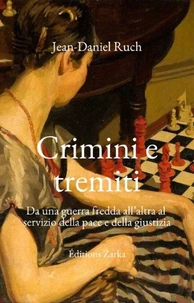Jean-Daniel Ruch tells his story, from the middle of the issues facing the world today. From the democratisation of the Balkans in the 1990s to Turkey's attempts at mediation between Russia and Ukraine in 2022, a panorama of the history of the last thirty years unfolds before our eyes. The journey begins in the Jura region of Switzerland during the most heated period of the Jura conflict that agitated that part of Switzerland until recently.
The childhood experience contributed to the author's political education: there he discovers verbal and physical violence, the battles of narratives and propaganda, and the tearing apart of identities. Almost naturally, it was followed by his involvement in conflict zones in Europe and the Middle East. Either to right wrongs - the prosecution of Balkan war criminals - or to prevent further violence or point the way to peace - his work in the Israeli-Palestinian context.
A leitmotif recurs throughout the text: the desire to understand people, individuals. How can a young man become a war criminal? What drives people to hatred? What arouses fear? Violence? Rejection of others? The keys are to be found, of course, in the individual and collective history of peoples. We are in the habit of reacting emotionally to everything the news channels broadcast. Jean-Daniel Ruch, in contrast, says that good decisions and policies must be the fruit of knowledge and reflection.
He offers us some clues as to how to get to the root of today's conflicts.
The Author:
Born in Moutier in 1963, Jean-Daniel Ruch studied international relations in Geneva. After four years in the Department of Defence, he joined the Swiss diplomatic service in 1992. He worked for the OSCE in Vienna from 1994 to 1997 and in Warsaw from 1998 to 2000. He continued his career in the Balkans, first at the Swiss embassy in Belgrade (2000-2003), then as political adviser to the prosecutor of the Yugoslavia war crimes tribunal (ICTY) from 2003 to 2007.
From 2008, he led Swiss policy in the Middle East as the Confederation became involved in the search for a two-state solution to the Israeli-Palestinian conflict. Jean-Daniel Ruch was Switzerland's ambassador to Serbia and to Montenegro (2012-2016), to Israel (2016-2021) and to Turkey (2021-2023).
Jean-Daniel Ruch tells his story, from the middle of the issues facing the world today. From the democratisation of the Balkans in the 1990s to Turkey's attempts at mediation between Russia and Ukraine in 2022, a panorama of the history of the last thirty years unfolds before our eyes. The journey begins in the Jura region of Switzerland during the most heated period of the Jura conflict that agitated that part of Switzerland until recently.
The childhood experience contributed to the author's political education: there he discovers verbal and physical violence, the battles of narratives and propaganda, and the tearing apart of identities. Almost naturally, it was followed by his involvement in conflict zones in Europe and the Middle East. Either to right wrongs - the prosecution of Balkan war criminals - or to prevent further violence or point the way to peace - his work in the Israeli-Palestinian context.
A leitmotif recurs throughout the text: the desire to understand people, individuals. How can a young man become a war criminal? What drives people to hatred? What arouses fear? Violence? Rejection of others? The keys are to be found, of course, in the individual and collective history of peoples. We are in the habit of reacting emotionally to everything the news channels broadcast. Jean-Daniel Ruch, in contrast, says that good decisions and policies must be the fruit of knowledge and reflection.
He offers us some clues as to how to get to the root of today's conflicts.
The Author:
Born in Moutier in 1963, Jean-Daniel Ruch studied international relations in Geneva. After four years in the Department of Defence, he joined the Swiss diplomatic service in 1992. He worked for the OSCE in Vienna from 1994 to 1997 and in Warsaw from 1998 to 2000. He continued his career in the Balkans, first at the Swiss embassy in Belgrade (2000-2003), then as political adviser to the prosecutor of the Yugoslavia war crimes tribunal (ICTY) from 2003 to 2007.
From 2008, he led Swiss policy in the Middle East as the Confederation became involved in the search for a two-state solution to the Israeli-Palestinian conflict. Jean-Daniel Ruch was Switzerland's ambassador to Serbia and to Montenegro (2012-2016), to Israel (2016-2021) and to Turkey (2021-2023).

 , qui est-ce ?
, qui est-ce ?